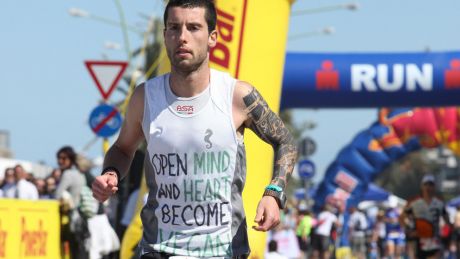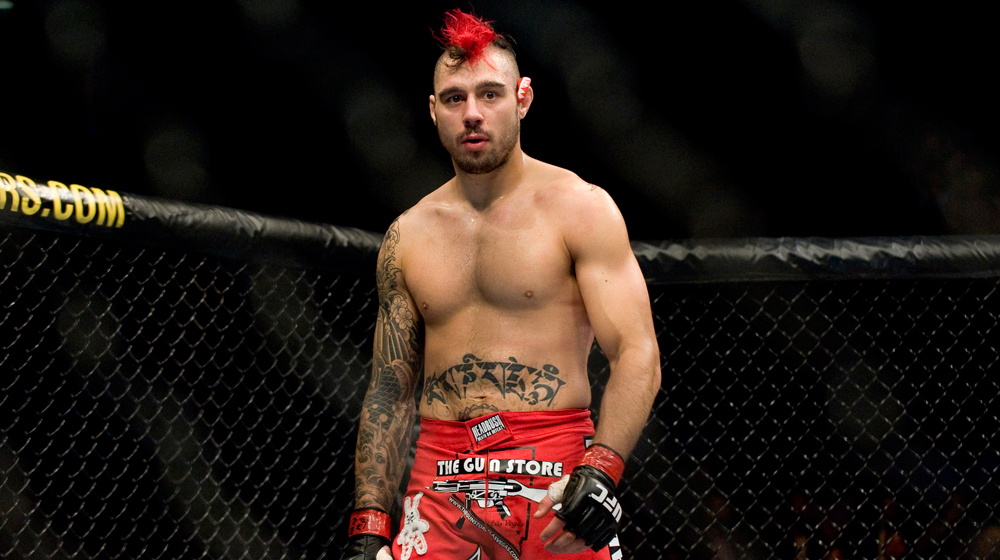
The Iron Man
Via some marriage of evolution and marketing, we’ve been led to believe that red meat is linked to strength, skinless chicken makes you healthy, and that to really make it in this life you should probably channel Rocky Balboa and down a dozen raw eggs before work.
On the other hand, there is an argument that we should be cutting out animal products altogether. Coach went in search of three successful sporting vegans to find out why they decided to drop meat and dairy from their lives.
RECOMMENDED: The Vegan Diet
Manuel Comandini (pictured above), Iron Man athlete, 29, vegan since 2012
What inspired you to go vegan?
There wasn’t one particular factor that prompted this choice. Before going vegan I viewed myself as a defender of animal rights – I took part in protests, I was against animal testing and I viewed bullfighting as a horror show. Then I saw some PETA videos and other documentaries, and I learned more about what happens to animals in factory farms, zoos, fur farms and so-called “research” facilities. I essentially went vegan overnight.
What effects has it had on you?
After just a few months of vegan life, I noticed that my usual pollen allergy symptoms were missing. I had suffered from this allergy since I was six years old, and every doctor that I talked to had said that I’d have to live with this problem for the rest of my life. After turning to a plant-based diet, I found that this allergy completely disappeared. In my four years of being vegan, I’ve never taken medicine.
RECOMMENDED: Why Are Hay Fever and Other Allergies on the Increase?
Get the Coach Newsletter
Sign up for workout ideas, training advice, reviews of the latest gear and more.
Wow…
I know! And aside from the almost-complete disappearance of all illnesses, I’ve also noticed an incredible increase in energy: by eating a plant-based diet, with the bulk of it coming from fruit and vegetables, my physical and mental vitality has shot up.
How has it helped your performance in the Ironman races?
The main thing that I’ve noticed is the recovery speed. As an omnivore, it took me much longer to get my energy back after a race. Now, when preparing for Ironman races, I mainly eat fruit – mostly dates, which I can easily take with me anywhere – and I have lots of energy. They are rich in carbs, and I don’t feel the need to take gels or supplements – I’m not aware of the exact contents of these products, so I prefer not to have them.
So you get your energy from fresh fruit?
Yes preferably organic and Fair Trade certified. In my opinion, fruit should make up at least 70% of our meals. It’s rich in simple carbohydrates, it’s easy to digest – it contains vitamins, mineral salts, antioxidants, calcium, iron, potassium, magnesium and so much more. I always eat fruit the way it should be eaten – on an empty stomach, to avoid fermentation.
What do you miss most about your pre-vegan diet?
Nothing! Going vegan doesn’t mean giving anything up. You can still find delicious food. There’s ice cream made from lupine seeds, soya, rice or almonds. You can find croissants, pastry and cakes made in a cruelty-free way. There are steaks and burgers made from soya, seitan, tempeh, vegan cheeses. Being vegan is nothing to do with missing out on the things you like – it means saying “no” to the suffering and killing of billions of animals each year.
How have people reacted to your choice?
Lots of people think I’m a crazy extremist, some said I’d always feel weak, that I’d miss out on crucial nutrients that plants don’t offer. Someone told me that I’d get sick more often. None of this is true. When going vegan, my main goal was to set a concrete example for myself and others, to show people that I could be vegan and an athlete.
What’s the most stupid question you’ve been asked?
There are really so many, I can’t even choose one. I’d like to ask a question though – what’s more revolutionary and peaceful than a switch to a vegan lifestyle?
The UFC Fighter

Dan Hardy, former UFC fighter and commentator, talks to Coach about how going vegan helped his training.
Dan “The Outlaw” Hardy, former UFC fighter and commentator, 33, vegan since 2012
Why did you become a vegan?
My sport is guided by weight classes, so I’ve always been really up on my diet, and I just found that if I had heavy animal-based products, the next morning I would feel very sluggish in training. I also found that during fight week if I ate too much meat I’d struggle to get my weight off.
So you completely cut out meat and dairy?
Basically yes, it started off purely as a thing to benefit my preparation for a fight. Then I started to speak with vegans who were successful on plant-based diets, and I realised that there were more benefits than just making me feel better. Red meat is in your system for weeks, and if I’m trying to make a weight class I need to have my system as clear as possible.
Is it easy to control your weight on a vegan diet?
No it’s still quite difficult. In a vegan diet lots of your protein comes from nuts and seeds that have got fats in them, and lots of high-protein vegetables are quite heavy in carbohydrates. That made it quite difficult so I had to change my whole approach to weight cutting. Fortunately there are lots of good supporting products if you are starting out, and a lot of good information. It’s getting easier.
What do you tend to eat?
When I’m travelling I’ll have protein bars, even though they’re still not the best quality of food. I’ll often switch to a fruit-based diet, too – I eat a lot of fruit, and you can find nuts and stuff wherever you go, even if they’re salted ones, you can wash them in water and they’re fine.
It sounds like a lot of work…
It’s not, you feel great, you just have to be a bit creative. Often if you go to a restaurant, if there is a vegan option on the menu at all, it’s usually the only one.
How do other people react to your diet?
As I’m an athlete people expect me to have a high-protein diet. The misconception about people who have a vegan diet not being physically fit and strong is nonsense propaganda from the meat industry. I think people are starting to see that.
What about other fighters?
In my experience, Mixed Martial Arts fighters are very open-minded, they are constantly looking outside their diets for an advantage. The only drawback is that people will hear that you’ve switched to an all-vegetable diet and expect you to be less strong, which isn’t the case at all.
How did going vegan affect your performance?
Physically I felt lighter. My mind was clearer, my energy levels were higher, I felt more alert. My body’s energy wasn’t being invested in digestion. If I eat a big bowl of steamed vegetables and some rice, because it’s predominantly water-based, my body can pull the nutrients out of it and leave whatever’s left over, but with meat it’ll sit in my gut for days and it’d just make me feel sluggish.
So are you a vegan for life?
I don’t know. The problem I have with veganism is that once you take your money out of that market you are no longer relevant to that industry, so I went from eating meat every day to not eating meat and no one really noticed. But if I occasionally invest my money in ethically-sourced things like local free-range organic eggs, then I’m investing in an industry that I believe in.
The Snooker Player
Peter Ebdon, former world champion snooker player, 45, vegan since 2011
When did your interest in veganism begin?
I started researching diet and nutrition after my dad passed away from lung cancer in May 2011, and the more research I did the more obvious it became that a plant-based diet was the way to go.
So it was mainly for health reasons?
No, not entirely. For people who don’t know, all animal products or dairy products contain growth hormones, antibiotics and steroids. All meat, when it’s cooked, becomes carcinogenic, which is why cancer is so prevalent. Someone suggested I watch a documentary called Earthlings, which is all about how animals are treated and what goes on in slaughterhouses, and I immediately thought, “That’s it, I’m vegan now”. I couldn’t knowingly be part of that any more.
Was it easy to suddenly change your diet?
It was very easy. We’re not omnivores – naturally by design we’re primates so we’re intended to eat fruit, nuts, seeds, green leafy vegetables.
Do you have to make loads of weird substitutions to get enough protein?
That’s actually a popular misconception. We need very low levels of protein, and the plant-based protein is very safe whereas animal proteins are very dangerous, and unfortunately most of the people in hospital these days are suffering from the long-term effects of eating animal products. That is the truth.
Did going vegan affect your snooker?
Definitely – my eyesight improved 50%, my digestion was better, and my sleeping was better. Digestion is unbelievable on a vegan diet.
How did people react to you?
A lot of people thought it was unnatural, because people think we need all of this protein to function – like I said, it’s not true. Protein comes from the Greek word “Proteus” which means “of prime importance” because that’s how important they thought protein was when they discovered it. In actual fact subsequent research has discovered that the body recycles it.
What do you miss most?
Not a lot to be honest – it’s been almost five years since I ate any animal products and I feel fantastic. One thing though, if you do go vegan, you must get a good source of vitamin B12 – it’s absolutely crucial, vital for blood, spinal fluid, all sorts of stuff.
Where would you get that from?
Unfortunately you can only really get it naturally from meat, eggs, dairy and fish and a lot of people would say, “Well surely that’s an argument for not being vegan” but that’s absolutely not true. We only need a very small amount, so I’d recommend that all vegans supplement with it.
What’s the dumbest question people tend to ask?
Well, there’s a great caption that’s shown in vegan publications where you’ve got an overweight family asking a very slim, healthy looking family of vegans, “But where do you get your protein from?” That really sums up the whole thing for me, people are so obsessed by protein – but where you’re getting it from, you’re also getting 20% or 30% fat and that fat isn’t good for you at all. That’s why people get heart disease and strokes.
You’re very passionate about this…
I am. When you go vegan, your body starts to break down all the toxins from the animal products you’ve been eating and for the first two weeks you might not feel so good, but then after that you’ll feel great. I feel the best I’ve ever felt in my life.
